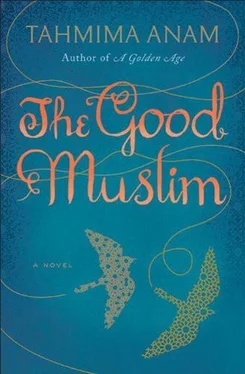She swallowed hard and began. ‘It was just after liberation, just after Piya came. I started working at the Women’s Rehabilitation Board. Ammoo too. We went to the office together, to volunteer. And they gave her the job of talking to the war widows, sorting out their pensions, their property. Negotiating with their husbands’ families.’ She took a deep breath, steadying herself for the next part. ‘And, Bhaiya, because I had medical experience, you know, from the camps, they assigned me to the wards. I performed abortions.’
She folded and unfolded and refolded Sohail’s prayer cap. ‘I didn’t tell you. You thought I was just helping the sick ones but we had a whole clinic at the back, where the women came to get rid of the babies. You remember what Sheikh Mujib said? That he didn’t want those bastard children in our country. But some of them — it was hard, you know, I didn’t think so much about it at the time — they wanted to get rid of them, but when it came time to do it they would cry. And then they would wake up and ask us to put the babies back. One day, Piya came to the clinic. She asked to see me — Ammoo didn’t know, she came straight to the ward. And she asked for a checkup. She was pregnant, Bhaiya, did you know?’
She couldn’t look at him. She said to herself, look at him when you tell him. But she couldn’t, she couldn’t look at him. She looked at the books instead. Her eye fell on Brideshead Revisited . To Waugh, she said, ‘She was early, you could hardly see. It must have happened towards the end of the war.
‘She wanted an abortion. Right now, she said. Do it right now. I was busy, I had ten other patients that morning, but I told her to wait, I said I would do it. Today, she said, it has to be today or I won’t be able to. I’ll tell him , she said. I didn’t understand what she meant, but I talked to the in-charge doctor and made the appointment. But by the time I came to her, she was nervous. I’m not sure, she said. She asked for you, she said please call Sohail Bhai. But you were in the cantonment that day, remember, you’d gone to quit the army. There were formalities, you were away all day. I thought she was scared, just scared like the others. I thought about bringing her home but I remembered what she said, that it had to be that day or she would lose her nerve. I knew what to do; I did it all the time, persuading the girls they were doing the right thing, for their families, for the country. If you have the operation you can go home, I said to her, your family will take you back. You are a Birangona, I told her, a war hero—’
The words came rushing back to Maya, the words she had been taught.
‘Defiled by the enemy. The child in your womb is a bastard child, a vial of poison. You must not allow it to come into this world. You must not give it the milk of your breast. What has been done can be undone. You must not live with it for the rest of your life. You must not mother this child. Do not think of it as your child, it is the seed of your enemy, I told her. Finally, she agreed.’
Sohail was sweating, thin lines of water bisecting his face. He didn’t move to wipe it away. Now he remembered the day he had found her in that prison, how he had carried her out of there, the short stubble of her hair rubbing coarsely against his collarbone. ‘Take me home,’ she said, ‘I want to go home, take me home.’
They were in a small bamboo grove, as far from the barracks as he could carry her. But the land was flat, and every time the building caught her eye she howled, so he propped her against a tree with her back to the prison. He sat in her line of vision, where the sun struck her face, casting a long, elegant shadow across her. ‘My village is east,’ she said.
They had brought her there in a jeep. ‘There was another girl, but she died.’
She told him the name of her village. Dhanikhola. Will you take me? The war is over, he told her. They would walk. At every village they were greeted with tired cheers and the small scraps of the harvest that were leftover from the war. Village after village, Pahara, Mormora, Lalkhet. Every mother wanted him to be her son, returning tired and whole with a woman in his arms.
She was eighteen. ‘My sister is the same age,’ he said.
‘You have a sister?’
‘Yes, Maya. She went to work at the refugee camps across the border.’
‘All by herself?’
‘She’s a very spirited girl.’
Piya had wide-apart eyes and a raw, aching quality to her voice. On the third day she waded into a village pond. He watched, worried she would stray too far. The sun struck the back of her, catching her hands as they moved across the water, propelling her forward. When she was neck-deep, she dipped her head under. Her sari floated to the top, flowering. And when she came up again, she was different, as though she had gone under and told all the bones of her to put themselves back in order. That was how she emerged: neat, organised. Wide apart eyes and a bruise in her voice. He asked if she would ever come to Dhaka, if she would visit. They were close now, only a few miles away.
They came to the edge of the village, and it was exactly as she had described it: a patch of trees casting a pale green tinge on neat houses of mud and straw. Round cakes of dung scalloped on to the outside walls, palm-printed by those who had collected it. A pond. Everything hushed, the fog hanging low and swallowing the cries of the koel, the ripple of water.
He wrote his address on a scrap of paper, knowing she couldn’t read, knowing every part of her would be examined, explored. She would toss it into the fire. She would never come.
He put his hand to his forehead and said goodbye. Formal. It was Piya who stepped close, who put her palm, scented with water, on his cheek. She who raised her face, kissed him lightly on the mouth, her lip rough and small, like the husk on a grain of rice.
She had learned a few words of English. See you again, she said, expanding the distance between them with her choppy, awkward syllables.
And she did come. She came and they spent their hours in the garden, talking about everything and nothing. The memory of war began to fade. Until that night — now he knows it was after Piya had gone to see Maya in the hospital, but at the time it was just another day. He had gone to the cantonment to surrender his gun. In the last few weeks of the fighting they had given him a uniform, with a green-and-red badge sewn on the sleeve. At the cantonment he saw the other boys in his regiment, Farouq and Shameek and Kona, all of them signing up to remain in the army. They told him it was no surprise that he was quitting; they had never taken him for a company man. Without a cause to fight for, he didn’t belong. He had listened to the official speech and been discharged, without dishonour, from the Bangladesh Army. And he had returned still dressed in his uniform. He could give it back later, they said.
It was late and the house was quiet, everyone asleep, or so he had thought until he caught a glimpse of Piya in the garden. He could barely see in the dark, but it was unmistakably her, the straightness of her back just as it was when she had emerged from the village pond.
‘Marry me,’ he said, whispering into the dark.
She turned around, her gaze drifting to the other side of the wall. ‘Who lives there?’ she asked, pointing to the two-storey house.
‘No one. We have to find new tenants.’
‘It belongs to you?’
‘Ammoo built it. We lived off the rent after my father died.’
‘It’s very big.’
‘Two storeys.’
‘Have you been inside?’
‘Yes. Do you want to go?’ He unlatched the small gate built into the wall.
She was sure-footed, even in the weak light of the half-moon, slipping through the gate and on to the lawn on the other side. She climbed the three short steps and waited for him in front of the large dark double-doors.
Читать дальше












